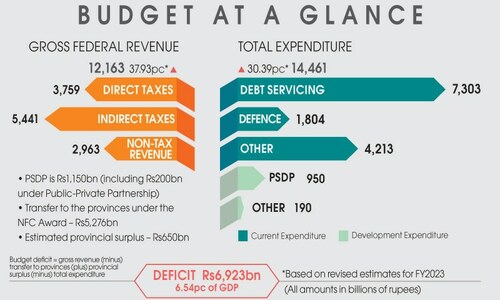• Claims govt working on possibility of restructuring its bilateral debt
• Stresses country will not default, approach Paris Club creditors or seek haircuts
• Says required funds allocated for elections, dismisses reports of ‘amnesty’ given in budget
ISLAMABAD: Apparently writing off the IMF programme for good, Finance Minister Ishaq Dar on Saturday spelt out the government’s so-called ‘Plan B’, working immediately next month on rescheduling the bilateral external debt of over $27 billion, which Pakistan mostly owes to China.
Speaking at his post-budget news conference, Mr Dar ruled out any discussions about restructuring external debt with multilateral agencies or Paris Club nations because “it’s not a dignified thing to do”.
“We will not bother multilaterals,” he said, adding that “rescheduling Paris Club [loan] is not on our menu”.
He, however, expected little from the International Monetary Fund (IMF) beyond disbursements under the long-delayed ninth IMF review, which would have released a $1.1bn instalment.
“There is no chance for the 10th review,” he said, implying that the current IMF programme of $6.5bn would conclude at around $5.1bn without the remaining 10th and 11th reviews for $1.4bn funds.
Therefore, the minister clarified, about $2.5bn indicated in the budget documents as expected inflows from the IMF would not materialise beyond $1.1bn under the ninth review.
On the other hand, he said Saudi Arabia and the United Arab Emirates had confirmed to the IMF their $3bn support to Pakistan, which, if they do not materialise until June 30, would flow in early next year.
Asked about debt rescheduling with bilateral partners like China, he did not name any country but said this was something the government wanted to start working on early in the next fiscal year after the budget is passed.
He said this would not be “haircuts or write-offs” but negotiations for longer-term arrangements, which is the norm given the Covid-19 pandemic, last year’s floods and other global and local challenges.
Pakistan’s overall bilateral debt amounts to around $37bn, but there is little space in around $10bn Paris Club debt due to its recent rescheduling under G-20 Debt Service Suspension Initiative (DSSI).
Almost half of the remaining Chinese loans fall in the bilateral category that could be considered for prolonging their servicing period while keeping the principal amount unchanged.
“We have done our working” and would take this up next month, he said. About $6bn in Chinese loans belong to commercial banks, while about $7bn worth of time deposits are normally rolled over on maturity almost every year.
To another question, Mr Dar said rescheduling bilateral debt was under consideration with or without the IMF. The decision to discuss another Fund bailout package would now be left to the next government after the general elections, he added.
At the same time, the finance minister emphatically discarded the possibility of sovereign default by any stretch of the imagination, saying Pakistan would ensure repayments to all multilateral creditors promptly as they become due.
He agreed that domestic debt accounted for almost 85pc of total public debt but ruled out its rescheduling, saying the domestic debt was not a problem even though banks had “cartelised” the domestic market.
He then took a dig at the previous PTI government for making certain legal changes in the central bank law under the IMF programme that “crippled the government”.
He said that during his previous tenure, and even before, the government used to borrow from the central bank and repay at the end of each quarter, so there would be no increase in debt in each quarter, but now the banks had increased their spread by up to 2pc over the central bank’s policy rate.
“We have to now review this system and see how corrective actions could be taken… bank’s monopoly must end,” he said.
He argued that rescheduling debt from domestic banks would be imprudent at this stage when interest rates were so high and rescheduling would mean prolonging higher rates into the future.
“We had re-profiled domestic loans in the past when interest rates were around 6.5pc and prolonged short-term debt into long-term. We will consider such a thing when the environment is conducive,” he said.
The minister, however, pointed out that the work was at an advanced stage, and the government would soon introduce a new system in which treasury bills could be directly sold to the general public instead of restricting them to commercial banks, which then raise funds from the people.
“We will do this within two to three weeks and the finance ministry would itself issue T-bills to the public,” he said.
Mr Dar left a little sense of ambiguity about general elections, due in a few months, although he said the government had allocated required funds in the budget for elections as a constitutional responsibility to ensure polls on time.
The minister dismissed certain reports as untrue that the government had offered amnesty in the budget to the people to convert their foreign exchange holdings at home into the official channel, saying someone might have seen some paper of proposals that did not come up for consideration or become part of the budget approved by the cabinet.
On the $800m outstanding privatisation proceeds of PTCL towards Etisalat, the finance minister said the matter was 17 years old and had been delayed because of a “very weak contract signed in haste” at the time of privatisation.
“We are in a weak position, but we are still using our friendly relations to secure a higher amount; otherwise, legally government of Pakistan has no chance to win,” he said.
To a question, Mr Dar said just Rs15bn had been targeted from privatisation next year, but the outsourcing of airports was at an advanced stage with the financial advisory of the International Finance Corporation (IFC) of the World Bank and companies from 12 countries had shown keen interest. “We will be inviting proposals for bidding in July,” he said.
The minister said the next year’s GDP growth target of 3.5pc was realistic with federal PSDP investment of Rs1.15tr, including private partnership and provincial development plans of over Rs1.6tr and federal budget outlay of Rs14.46tr.
He said the ad hoc relief of 35pc and 30pc for government employees would be based on their basic salaries and not on gross salaries. An official said the impact of the increase in salaries and allowances of civil and armed forces employees would be Rs90-100bn, including about Rs40bn for civil employees. The cost of pension adjustments would make another Rs50-55bn.
On high subsidies, he conceded that the government had provided Rs900bn subsidies for the power sector alone, which needed to be improved and noted that the power sector had been a key source of challenge while dealing with the IMF.
As for the European Union’s GSP+ preferential tariff scheme, Mr Dar said the commerce ministry and Foreign Office were proactively handling the matter and there were strong reasons to believe that the facility would be extended later this year.
Published in Dawn, June 11th, 2023
















































